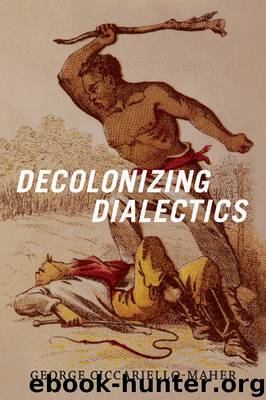Decolonizing Dialectics by George Ciccariello-Maher

Author:George Ciccariello-Maher
Language: eng
Format: epub
Publisher: Duke University Press
CHAPTER 5
VENEZUELA’S COMBATIVE DIALECTICS
Nowhere in our dialectical present screams out for attention quite like contemporary Venezuela, where combat and violence, nationalism and class-consciousness—not to mention Manichaeism and radical movement—are all on the table. But it would be misleading to excise Venezuela from its context, as an object to which a decolonized dialectics might be applied. Both this book and our contemporary political moment more generally are indelibly marked by the dialectical return swing against neoliberalism that was arguably inaugurated by Venezuela’s 1989 Caracazo, a massive popular rebellion against structural adjustment on the model of the Washington Consensus. More than for this single moment more than a quarter-century ago, Venezuela stands out due to the dialectical chain that 1989 unleashed—one which moves through the failed coup by Hugo Chávez in 1992, his subsequent election in 1998, and the development and deepening of a dynamic process that has come to be called “Twenty-First-Century Socialism”—each of these contributing to a seismic transformation of the region and the world.
The process of political change currently underway in Venezuela exploded out of the tense overlap of multiple combative identities in movement—Bolivarian, revolutionary, Chavista, Afro-Venezuelan, Indigenous, feminist—each with their own dialectics. But no political identity has been more central than that which draws them together in a combative whole that is nevertheless far from a singularity: the people. To settle on the people is merely to open another can of worms, however, since many view the people—like the nation—with a deep suspicion. Through a narrowly Eurocentric interpretation, philosophers like Michael Hardt, Antonio Negri, and Paolo Virno, for example, have dismissed the people as a closed unity, both homogeneous and homogenizing—the diametric opposite of the radicalized and decolonized dialectics I have sought to distill here. But if we reject this narrow interpretation, decolonizing the concept of the people by anchoring it in Latin American realities and revolutionary movements, we instead find a political identity that is far more dynamic and mobile, one which has borne combative fruit in contemporary Venezuela.
Download
This site does not store any files on its server. We only index and link to content provided by other sites. Please contact the content providers to delete copyright contents if any and email us, we'll remove relevant links or contents immediately.
| Anthropology | Archaeology |
| Philosophy | Politics & Government |
| Social Sciences | Sociology |
| Women's Studies |
The Bloomsbury Encyclopedia of Philosophers in America From 1600 to the Present by Shook John R(1204)
The Swerve by Greenblatt Stephen(1155)
Friedrich Nietzsche by Curtis Cate(1018)
History Of Western Philosophy by Bertrand Russell(902)
Mere Christianity by Lewis C. S(806)
The Swerve: How the World Became Modern by Stephen Greenblatt(803)
The Birth of Tragedy by Friedrich Nietzsche(761)
Beyond Fate by Margaret Visser(644)
The Great Divorce by C. S. Lewis(601)
The Forbidden Universe: The Origins of Science and the Search for the Mind of God by Lynn Picknett & Clive Prince(582)
The Age of Wonder: The Romantic Generation and the Discovery of the Beauty and Terror of Science by Richard Holmes(580)
El Mundo de Sofía by Jostein Gaarder(565)
God and the Atom by Victor J. Stenger(499)
Freedom's Right by Axel Honneth(487)
A Discourse on Inequality by Jean-Jacques Rousseau Maurice Cranston (translator)(464)
How to Think About the Great Ideas by Mortimer J. Adler(461)
Leviathan by THOMAS HOBBES & MICHAEL OAKESHOTT & RICHARD S. PETERS(454)
Existentialism and Excess: The Life and Times of Jean-Paul Sartre by Gary Cox(439)
The Hedgehog and the Fox by Ignatieff Michael Hardy Henry Berlin Isaiah(425)
